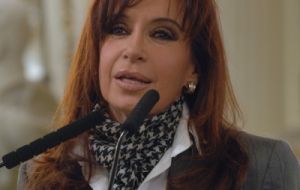MercoPress. South Atlantic News Agency
Dispute over Argentine Central Bank reserves faces long judicial dispute
 Mrs. Kirchner insisted Argentina needs to restructure debt “so our companies can access cheaper financing”
Mrs. Kirchner insisted Argentina needs to restructure debt “so our companies can access cheaper financing” Argentine Federal Judge María José Sarmiento postponed Monday her ruling over the use of Central Bank currency reserves to meet 2010 debt payments by turning the government's 'appeal on grounds of unconstitutionality' into an ordinary trial.
The Magistrate took the same decision over the appeal against her decision to reinstate Martín Redrado as President of the Central Bank. The joint cases will now follow the usual proceedings. Sarmiento's ruling backed the proposal made by opposition parties. All parties now have five days to file their appeals in the case.
With this change, Sarmiento won't have to take decisions before the end of the day Tuesday as it would have been the case if the condition of 'appeals on grounds of unconstitutionality' had been maintained.
The government filed both appeals last Friday, after Judge Sarmiento's rulings blocked the creation of the Bicentennial Fund (plan consisting in using a third of the nation's reserves to pay off 2010 debt) and reinstated Martín Redrado as President of the Central Bank by invalidating the President's decree
President Cristina Fernández de Kirchner on Monday defended the creation of the Bicentennial Fund saying that “it is indispensable for Argentina to restructure its sovereign debt “so our companies can access cheaper financing.”
“The debt payment is essential to access international capital markets,” Mrs. Kirchner repeated, during a rally at Banco Nacion headquarters.
“In 2006, Argentina cancelled its entire debt with the International Monetary Fund- totalling 10 billion US dollars by using 100% of the Central Bank currency reserves. The Bicentennial Fund represents just 30% of the Central Bank currency reserves.”
“Argentina's Domestic Gross Product is currently higher than in 2006,” she added.
“The creation of the Bicentennial Fund has been well received by all sectors linked to local and international markets,” Cristina de Kirchner concluded.
Meantime the Argentine Congress, summoned by Vice President Julio Cobos, decided to invite the government’s block to agree on a date for a special session to take place in order to discuss the legitimacy of the presidential emergency decrees.
According to Cobos' statements, the meeting points at “finding the earliest date” to fix a session, which could be February the 3rd or “it could even be before that day.”
At the Central bank reinstated president Martín Redrado confirmed that he is willing to stay as the head of the entity. Carrying out his tasks, he appointed a new General Manager for the institution, Raúl Omar Planes.
“I still remain as the president of this entity and I keep filling my post firmly, as I have been doing for the last five years,” Redrado pointed out when he was entering the Central Bank.
Redrado avoided talking about the possibility of embargoing the reserves, an issue which he described as “delicate” one.
“This is an absolutely delicate issue which affects Argentina's interests and due to this, I am not planning to make any comments about it,” he declared when the possible embargo of the reserves, requested by those shareholders who were left outside of the debt swap, came up.
Within this framework, the economist summed up: “Any opinion could be in opposition to the country's interests.”
At the same time Federal Judge Norberto Oyarbide authorized the processing during judicial recess of a lawsuit filed by the Argentine Government against Central Bank head Martín Redrado for alleged “non-fulfilment of a public official's duties.”
Court sources said the magistrate then handed the suit over to Federal Judge Guillermo Marijuan. The latter will decide on the legitimacy of the suit against Martín Redrado, filed by Treasury Prosecutor Osvaldo Guglielmino.
Oyarbide is the judge who acquitted the Kirchner couple in a case of alleged embezzlement, after the couple's patrimony rose by 158 percent in 2008.




Top Comments
Disclaimer & comment rules-

Read all commentsCristina : ...you are wonderful..magnificent...no 1 patriot..
Jan 12th, 2010 - 06:23 pm 0guaranteed the second term presidency !! really.!!
Commenting for this story is now closed.
If you have a Facebook account, become a fan and comment on our Facebook Page!